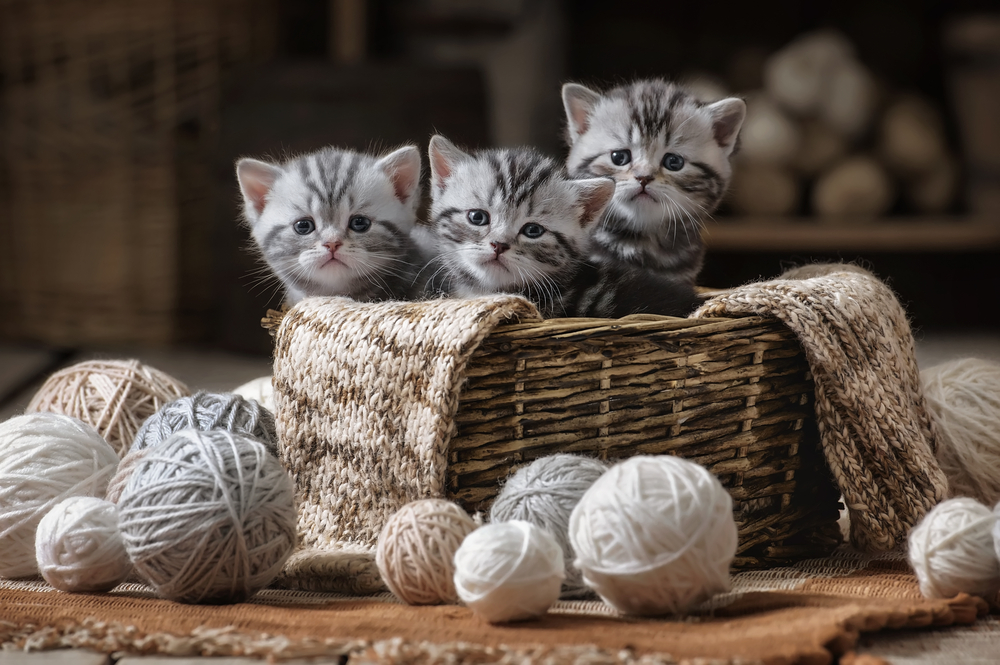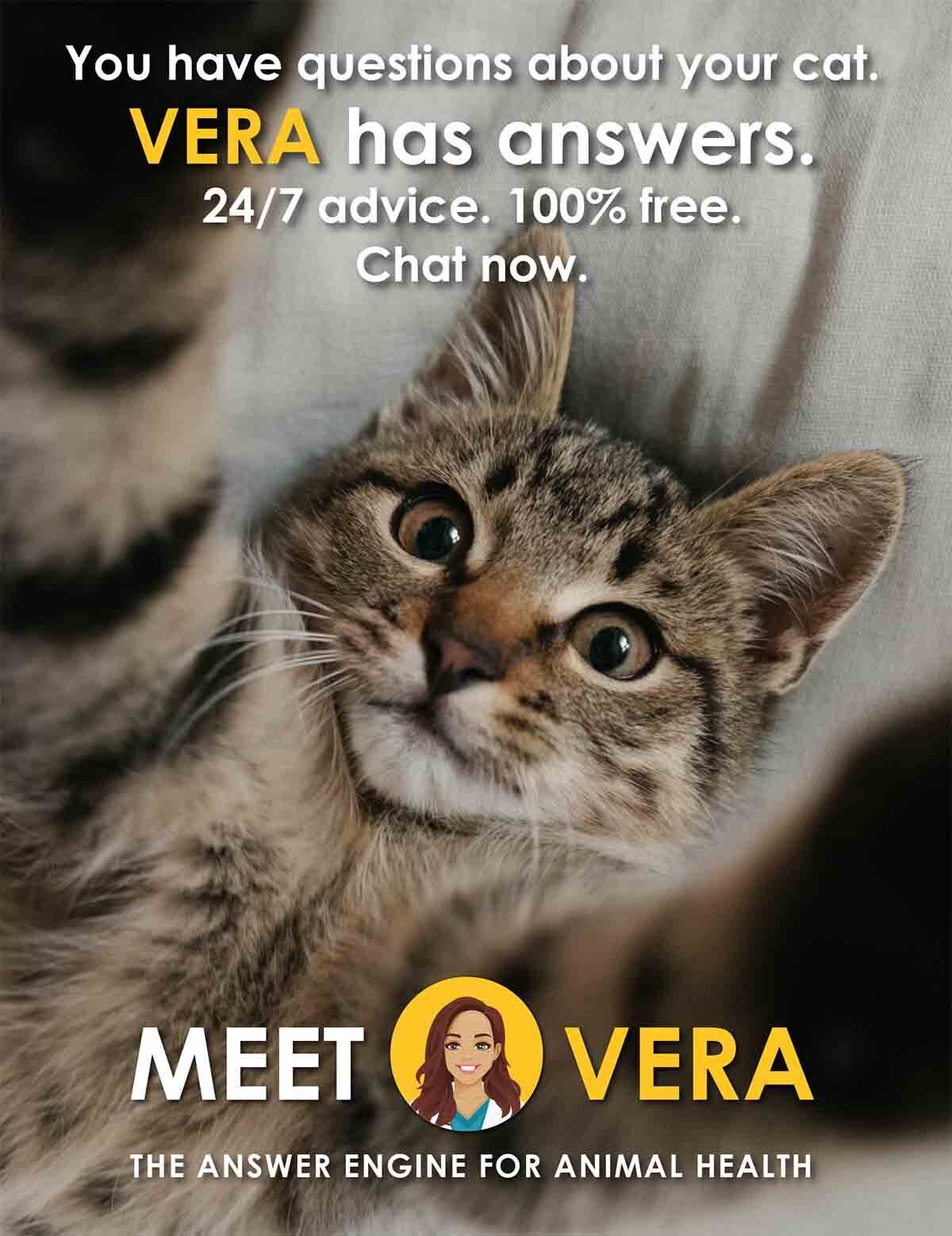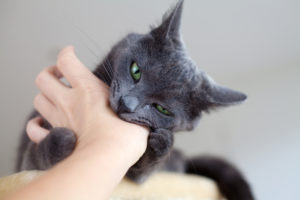Written by: Allison Ward, DVM
Maybe you just adopted a sweet little kitten from the shelter, or your adult cat hasn’t been to the vet in a while. Perhaps your perfect purrbox recently had her yearly wellness exam, and you’re wondering, “what vaccines did my veterinarian give my cat? Did she really need them?” Here, we’ll answer the most commonly asked questions about cat vaccines and the diseases they protect your kitty against! Spoiler alert: follow your veterinarian’s personalized recommendations for your cat—and congratulate yourself on providing your cat with the best, most effective preventive care possible!
Vaccines for Indoor Cats
The Rabies Vaccine
If you’re not familiar with what vaccines your cat needs, then chances are you have at least heard about vaccinating your cat for rabies. The rabies vaccine is given once during kittenhood (generally between the ages of 12 weeks and 16 weeks), boostered one year later, and then given every one to every three years for life. The rabies vaccine is the ONLY legally required vaccination for pet dogs, cats, and ferrets in the United States.
Why is the rabies vaccine required? You may be surprised to learn that the government requires all eligible pets be vaccinated for rabies to protect PEOPLE!
Rabies is easily transmitted between species, and is common among such wild animals as raccoons, foxes, bats, and other mammals. (Birds and reptiles CANNOT carry or transmit the rabies virus.) Once a rabies-infected animal bites another animal, that animal then becomes infected…and goes on to bite other animals to infect them, if given the opportunity.
Sadly, there is NO cure for rabies once an animal shows symptoms of infection—and this includes humans. Around the world, over 50,000 PEOPLE die each year from rabies. Tragically, most of them are children who receive bites from rabid dogs and cats with whom they interact. The reason why we see so few human deaths from rabies in the United States is precisely BECAUSE of the government mandate for pets to be vaccinated against rabies, and doctors emergently treat humans that have been bitten and potentially exposed.
In addition to receiving a fine from your local government if your cat is not current on her rabies vaccine, there are other legal consequences if you do not vaccinate your cat for rabies. Local public health departments have rules for quarantining pet dogs and cats who bite a person. If your beloved cat is not current on her rabies vaccine, and bites a person (even out of fear or pain)—that can lead to a long, expensive quarantine…or even worse.
To make sure you are complying with the law, it is essential to keep your cat up-to-date on the rabies vaccine. You might be wondering, “my cat always stays inside! Why in the world would anyone think she should be vaccinated for rabies when she doesn’t come in contact with other animals?”
Unfortunately, life is unpredictable—and indoor-only cats can accidentally escape outside, leading to interactions with wild animals. It’s a bit unnerving to consider, but wildlife can also make its way INTO your house—have you ever heard of someone finding a bat in their attic, or battling one that flew down the chimney? There have even been cases of raccoons and other animals coming inside our homes! ANY of these possibilities mean a potential tussle between your indoor cat and either a wild animal infected with rabies, or an unvaccinated stray cat.
The FVRCP (aka “Distemper”) Vaccine
According to the American Association of Feline Practitioners, the FVRCP vaccine (also referred to as the “distemper vaccine”) is strongly recommended for all cats—even those indoors. This vaccine protects your cat from common viruses that are transmitted between cats, including some that can potentially be transmitted by YOU if your clothing comes into contact with an infected cat’s outdoor habitat! A kitten’s first FVRCP vaccination is ideally given at the age of 6 to 8 weeks, and repeated every 2 to 3 weeks until the kitten is at least 16 weeks of age (see below). As an adult cat, the FVRCP vaccine is given once a year to once every three years.
Panleukopenia (the “P” part of the FVRCP abbreviation) is also known as feline distemper virus. This is a HIGHLY contagious virus that causes serious illness and has a high fatality rate in cats who start to show symptoms of this disease. It is spread via all sorts of body secretions from infected cats (respiratory droplets, saliva, urine, feces/diarrhea) and is unfortunately a very hardy virus. In fact, the virus can survive indoors for over a year at room temperature, and freezing temperatures outside will NOT kill the virus! Tragically, even dogs who wander around areas where outdoor unvaccinated cats spend their time can bring this virus into your household on their fur, and you can bring it inside on your shoes. Then, if your kitty sniffs your pup or your shoes, they can become infected if enough virus particles are breathed in or ingested by your cat. Symptoms of this virus include sneezing, pneumonia, diarrhea, vomiting, weight loss, and eventually death. Fortunately, the FVRCP vaccine is extremely effective at preventing illness from panleukopenia (distemper).
Other diseases protected by the FVRCP vaccine are feline herpes and feline calicivirus. Both of these viruses are common and affect the respiratory tract. They are transmitted from cat to cat via nasal droplets (sneezing) and grooming behavior. Both herpes and calici infections can cause sneezing, runny eyes, and a loss of appetite. A high-grade fever (even up to 107 ℉) is more often associated with some strains of calicivirus. For some unfortunate cats with herpes, the virus can even infect the surface of the eye and create a painful scratch, also known as a corneal ulcer.
While a cat is battling either of these viruses, their busy immune system and the inflammation of tissues in the respiratory tract make it likely for the poor infected kitty to develop bacterial infections as well, which usually require antibiotics to treat. With severe viral and/or opportunistic bacterial infections, pneumonia can develop, possibly leading to a life-threatening illness. The FVRCP vaccine will not completely prevent ALL infections from these viruses, but a vaccinated cat’s symptoms from an infection will be much more mild than the symptoms of a cat who is unprotected.
The FVRCP vaccine can be administered via injection (just like the rabies vaccine), given as a nasal drop (intranasal vaccine), or its components can be split and protection from the respiratory viruses given intranasally, with the panleukopenia vaccine given by injection. Discuss more with your veterinarian for any concerns regarding common cat vaccine reactions.
Vaccines for Outdoor Cats
The Feline Leukemia Vaccine
There is one more additional vaccine that ANY cat who spends time outdoors—or who is an “escape artist” known to bolt out of the house, given the opportunity—should receive on a regular basis: the feline leukemia vaccine!
Most people have heard of leukemia in humans as a devastating type of blood cancer. In cats, one form of leukemia is actually caused by a contagious virus (called, appropriately enough, the feline leukemia virus, or “FeLV”). It is spread through close social contact, such as grooming, licking, bite wounds, or sharing food and water bowls. It is also commonly spread to kittens either before birth or while nursing from an infected mother cat. Unfortunately, infection with feline leukemia virus can be (but is not always!) devastating and deadly.
The feline leukemia vaccine is very effective at preventing infection in a cat who has not been exposed to the virus. Once a cat has been infected with the virus, however, there is no treatment or intervention that can prevent that cat from potentially spreading the virus to other cats. Kittens are more vulnerable to feline leukemia infection, and the American Association of Feline Practitioners recommends that EVERY kitten who has a negative blood test for feline leukemia receive two doses of FeLV vaccination two to three weeks apart. Adult cats should be boostered with this vaccine every year IF they are at risk of coming into contact with other cats outside of the household (i.e, outdoor cats).
Just like indoor cats, outdoor cats should be kept up-to-date on their rabies and FVRCP vaccines as well.
Why Do Kittens Need So Many Vaccines?
Finally, you may be wondering why kittens need repeated vaccines every two to three weeks? The answer—as you might expect—lies in your kitten’s immune system and how it matures!
After your baby kitten was born, he nursed from his mother cat (the “queen”) for several weeks. During the first two days of his life, your kitten was receiving colostrum—a special kind of milk produced by the queen just after birth. The colostrum contains valuable antibodies against all kinds of infections, and your kitten’s intestines were able to absorb these antibodies. These antibodies provided him some immunity from any infections the queen has successfully fought off in the past!
By receiving colostrum, your kitten is able to fend off some infections thanks to this special protection from the queen! However, this antibody protection does not last long, and fades at any time from 14 weeks of age to 20 weeks of age. Some queens who are malnourished during their pregnancy or sick from other reasons may not be able to pass many antibodies through their colostrum, and kittens can receive different amounts of antibodies based on their birth order and other factors. You can probably appreciate that the timeframe that maternal protection lasts is VERY variable, and the amount of protection your kitten receives in those first few days can fade as early as six weeks!
While the queen’s antibodies are circulating in your kitten’s bloodstream, any vaccines given during this time will be overridden by these “maternal antibodies”—and essentially deactivated. Why, then, do we even bother vaccinating young kittens—especially at such young ages?
Well, in any individual kitten, there’s no telling how well-protected he is from any particular disease at any given time. We administer a series of vaccines to protect your kitten while the maternal antibodies are fading, and continue vaccination until we can be sure that his own immune system is mature enough to take over the protection against those specific contagious diseases. That’s why we continue to vaccinate until at least 16 weeks of age! Two weeks after the final kitten vaccine is given, the immune system is primed and ready to protect him all year long until it’s time for his adult booster vaccines.
The Bottom Line
While the rabies vaccine is the ONLY vaccine that is required by law for your cat, follow your veterinarian’s recommendations on the appropriate vaccine schedule for your kitty. After all, we want your cat to live a long, healthy life and vaccination is a wonderful and easy way to avoid some very common infections!
If you’d like to know more about feline infectious diseases, or what cat vaccines to discuss with your veterinarian, chat with our AskVet veterinarians 24-hours a day, 7-days a week. We are always here to help you and your pet!








